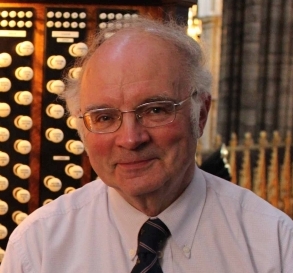David Butterworth (Nottingham)
The ‘NEAT 16’ recital (Nottingham European Arts and Theatre Festival 2016)
Allegro (Symphony no. 6, first movement): Charles-Marie Widor
Prelude and Fugue in C: Georg Böhm
Jesu, joy of man’s desiring: Johann Sebastian Bach
Introduction and Passacaglia in D minor: Max Reger
Chorale Prelude: Nun komm’ der Heiden Heiland BWV659: Johann Sebastian Bach
Toccata (Symphony no. 5, last movement): Charles-Marie Widor
Interval
La ronde des lutins: Julien Bret
Sonata on the Ninety-Fourth Psalm: Julius Reubke
Rosace: Henri Mulet
Toccata: Placare Christe Servulis (from Le Tombeau de Titelouze): Marcel Dupré

David Butterworth takes us round France and Germany with some giants of the keyboard. From Germany, starting with Bach’s artistic forebear (and possible teacher) Georg Böhm we come to the great master himself in reflective mood with two church-inspired pieces, one of which some listeners will associate with Dame Myra Hess and her wartime National Gallery concerts. Then it really is German giants: from a monumental piece from Liszt’s 24 year-old pupil Julius Reubke absolutely made for this organ, a work very much associated with David Butterworth, we then go to the equally monumental Max Reger whose Introduction and Passacaglia was written just ten years before the Binns organ in the Albert Hall came on the scene.
German organs were “loud” long before Bach’s time. It took till the mid-nineteenth century for French organs to catch up. Four of them inspired the “French Connection” part of today’s concert. Cavaillé-Coll’s largest instrument made the church of St-Sulpice resound with Widor’s creations every Sunday morning but his sixth symphony was written for a concert hall, the Trocadéro, while the Toccata from the fifth, famously recorded by the composer in 1932, was composed at his birthplace in Lyons. Mulet remembers the stained glass at the Sacré-Coeur while Dupré’s exciting Toccata recalls a wartime visit to his birthplace, Rouen.
Like the scribes in the Bible, David brings forth treasures old and new. The new this time is La Ronde Des Lutins by Julien Bret. Who said organists don’t have a sense of humour?
